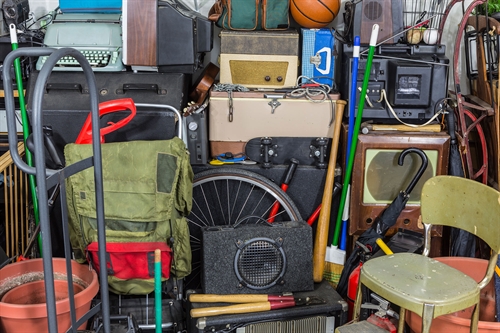Hoarding disorder puts families and carers in a very difficult position. Chaotically stored possessions are a danger to the owner and make it difficult for others to care for them. Many people with hoarding disorders keep items with no clear value – or with a value that those caring for them cannot perceive – such as junk mail or old newspapers.
Clutter can be dangerous
Clutter may make it impossible for your relative to use their kitchen or bathroom. It can also be a fire risk, and cause trips and falls. Excessive possessions may result in pest infestations, too. It might make it impossible for outside agencies, for example district nurses, cleaners and personal care providers, to do their job safely. And it may cause the house to fall into disrepair because tradesmen cannot get access.
Hoarding disorder can cause rifts in families, as the sufferer can become very defensive if someone tries to help by removing some of the possessions. It’s even worse if the hoarder does not see that they have a problem and has no understanding of the effect of their lifestyle on others. But some people with hoarding disorder may understand their clutter is a problem but, through shame, feel unable to seek help. Both these situations result in loneliness and social isolation and can worsen mental ill-health.
Self-storage is not the solution for hoarding
It may seem like a good solution to pack some of a hoarder’s possessions into a storage unit, while reassuring the owner that their things are safe. But unfortunately, hoarding disorder is one instance where self-storage is not the answer. Hoarding disorder is a recognised mental health condition, and simply removing the person’s possessions will do nothing to treat this, and is likely to cause distress and therefore make the condition worse. The thinking behind the disorder must be addressed as a first step or the clutter will just build up again in the home. Also note that most storage units will not let you store actual rubbish, and if the possessions are infested with pests, it will invalidate your insurance. If you're wondering about storing something but have doubts about whether it can be insured, you can always give us a call: it's definitely in our interests to give you honest advice, so you can rely on us.
Some families and carers try getting a junk clearing service in, but again, the clutter returns. This is also very distressing for the hoarder and may make family rifts much worse.
Is a collection a sign of hoarding disorder?
A collection – even of things that are in themselves not of great value (think matchboxes or stamps) is not in itself a hoard. A hoard is disorganised and takes over the space it is in. A collection is usually carefully organised and the items accessible. Think of the difference between boxes stuffed with unsorted stamps and shelves filled with labelled, organised albums.
While a storage unit is not a good solution for hoarding disorder, self-storage might help with a collection that is outgrowing its space, and we’ve got a blogpost on that.
How can you help someone who hoards?
It is very difficult to care for someone through recovery from hoarding disorder without professional support. A good start would be the Hoarding Icebreaker Form that will help you and the person with hoarding disorder to talk with professionals.
Hoarding disorder is recognised clinically and you can turn to the NHS for help with hoarding disorder by making a GP appointment for your relative and going along with them.
Your region’s social services may provide support to a household with a hoarding problem, particularly if there is a risk to your friend or relative’s safety.
You may find a therapeutic declutterer helpful. Look for someone who is a member of the Association of Professional Declutterers and Organisers.
The charity Hoarding UK has information and help for those who want to change their behaviour around hoarded possessions. It also has resources helpful to people caring for someone who has hoarding disorder.
And the mental health charity Mind is a great source of help and advice on hoarding, too.


